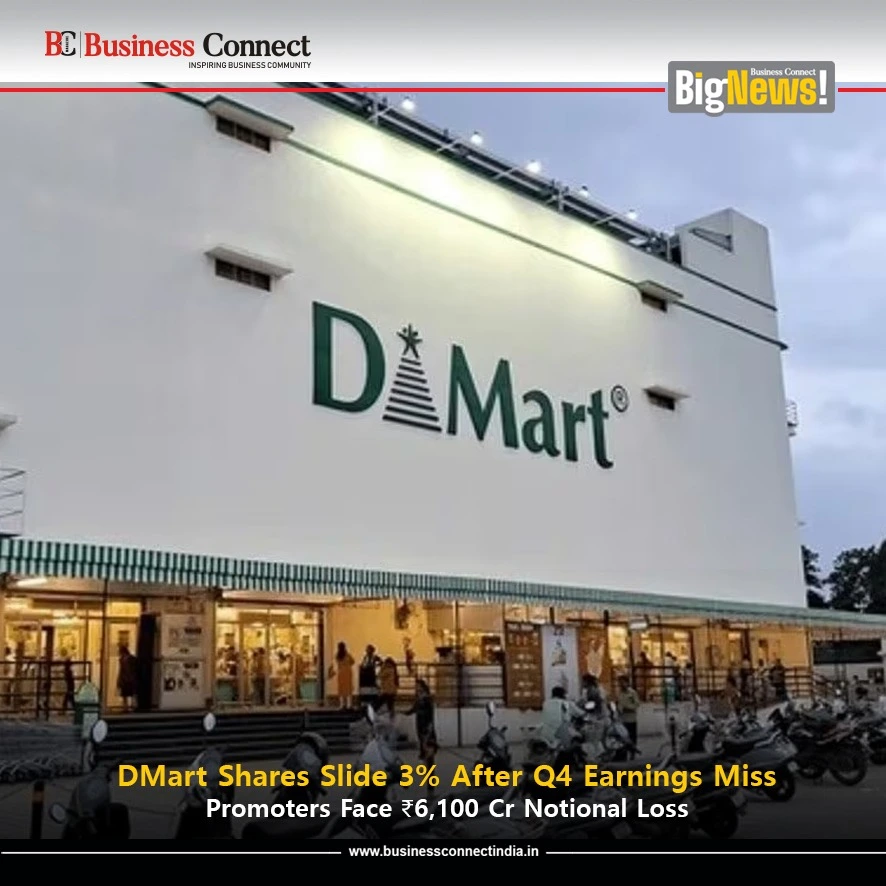By Business Connect Magazine, May 2025
Shares of Avenue Supermarts Ltd (#DMart) fell over 3% on Monday, May 5, 2025, after the retailer reported disappointing March quarter (Q4 FY25) results, missing analyst expectations. The stock dipped to a low of ₹3,916.15 on the BSE, erasing ₹6,100 crore in notional wealth for ace investor #RadhakishanDamani and other promoters, who collectively hold a 74.65% stake in the company. Here’s a look at the latest updates and what it means for investors and entrepreneurs.
Q4 Performance Highlights
Avenue Supermarts, which operates the DMart chain, reported a 2.2% decline in consolidated net profit to ₹551 crore in Q4 FY25, down from ₹563 crore in the same quarter last year. While total revenue rose 16.8% YoY to ₹14,872 crore, driven by store expansions, the EBITDA margin contracted to 6.4% from 7.4%, hit by rising costs and competitive pressures. Standalone net profit grew modestly by 2.6% to ₹620 crore, but fell short of market expectations due to higher operating expenses and wage surges.
Why the Drop?
Analysts pointed to multiple headwinds:
Increased Competition: Quick-commerce players like Zepto, Flipkart Minutes, and Amazon Tez are offering groceries at 2-3% lower prices, challenging DMart’s value proposition.
Margin Pressure: Gross margins softened due to intense pricing competition in the FMCG segment, while higher employee costs and store-expansion expenses weighed on profitability.
Metro Challenges: DMart’s metro stores face softer demand, though non-metro towns show resilience, with like-for-like growth at 8.1% in Q4.
Brokerages like Motilal Oswal cut their FY26-27 EPS estimates by 6-8%, citing near-term growth and margin concerns, but maintained a ‘Buy’ rating with a revised target of ₹4,350. HDFC Institutional Equities suggested a target of ₹3,850, reflecting caution.
Promoters’ Notional Loss
Radhakishan Damani and his family, holding 74.65% of DMart, saw their stake’s value drop from ₹1,97,248 crore to ₹1,91,144 crore in Monday’s trade—a notional loss of ₹6,100 crore. Damani, with a 23.03% stake, remains a key figure in India’s retail landscape, but the stock’s 12% yearly decline underscores rising challenges.
What’s Next for DMart?
Despite the setback, DMart added 40 stores in FY25, reaching 387 outlets, and its DMart Ready e-commerce arm grew 21.5% in the first nine months, with a focus on home delivery. CEO Neville Noronha emphasized resilience, noting, “Our value positioning is well-anchored, and DMart Ready’s home delivery is scaling strongly.” However, analysts warn that profitability in the online segment may remain elusive for now.
For entrepreneurs, DMart’s experience highlights the need to adapt to evolving consumer preferences and digital competition. As quick-commerce reshapes retail, balancing cost efficiency with innovation will be key.
Market Sentiment
Posts on X reflect mixed sentiment, with some investors concerned about margin pressures and others optimistic about DMart’s long-term store expansion strategy. The stock’s high valuation at 85x P/E remains a point of debate.
Stay tuned for more updates as DMart navigates this competitive landscape!
Follow Business Connect Magazine for the latest in business, markets, and innovation!
Add Business Connect magazine to your Google News feed



